“We have crossed the Red Sea
On a dry land
And have since had a trying time
Making the world believe our tale
But if we did not –
If we did not
How did we arrive here”
– Kobena Eyi Acquah; from Meditation: Atɛntɛbɛn Interlude in Movement Three: The Face of Freedom in Music for a Dream Dance, one of his poetry collections.
— from my Facebook post, dated 15th August, 2017.
*
Today, Facebook shows me this ‘memory‘ to ‘look back on’. And I can’t quite deal with it – the memory, the ‘sharing’ of it, the ‘looking back on’ it. All.
Some days and a year ago, my writer and filmmaker friend, Kingsley Kojo Antwi, lent me an anthology of poems by Kobena Eyi Acquah. I did not wait, could not wait to read the book and share excerpts of it on Facebook. This ‘memory’ was one such excerpt.
Soon, I was eager and greedy to devour the treats and feasts that I knew poem after poem in the anthology would spread before me. How I knew what I knew? I had one or seven reasons. But not too fast.
Sooner, and not at all surprised, I was falling in love all over again with the effortless mastery and wise grace of Kobena’s works – his poetry, in this case.
And all this is not even where this story begins.
I had first found about Kobena Eyi Acquah in a poem – yes, the import and impact of that poem on me was so strong and huge that it distracts/ed me from remembering its title. (For the purpose of this writing, I went searching for the title. Borrowed Airs it is.) The poem was featured in An Introduction to Language and the Language of Literature, a supplementary textbook for one of my early undergrad courses. The book was jointly written by three lecturers from the Department of English of the University of Ghana, Legon: Kari Dako, Gervase Angsotinge and Aloysius Denkabe.
Before I graduated, I found the anthology from which that poem had been culled at some obscure place at the then University Bookshop.
I was undone!
The price of the book was friendly and easy on my broke student wallet – yes, I do wallets, sometimes pockets, hardly purses. For I usually find purses too rigid in their fancy ways, simply impractical or just not-kind-of-it for me. But maybe that is just me. Or maybe I don’t even know purses enough.
But I digress.
So I rushed to the counter of the bookshop to pay for the book. While the person at the counter was pulling and punching and pushing things, I prayed. In my head.
I prayed that by some crude and cunning twist in fate or similar, I am not told, suddenly, that the book price was wrong, that the price had long been changed and whoever was to write the new, correct, higher! price must have forgotten…decidedly forgotten to do so.
I was afraid.
My fear died early. The book’s price was exactly what I had seen written somewhere on it. The book, it is a poetry anthology by Kobena Eyi Acquah. It was The Man Who Died.
I would cherish this book with a soft and jealous part of my head and heart. And I will croon myself sweetly tired to anyone who cared to listen about the gem of a poet I had discovered in the person and voice called Kobena Eyi Acquah.
I would later share this my love for Kobena with my good friend, Kwabena Agyare Yeboah. And I would find that Kwabena already knew about Kobena, more than I probably did. With Kobena for a meaningful chunk of inspiration, we talked and dreamed things. Kwabena and I.
And by this time, I had long graduated from the University of Ghana, Legon.

Fore grounds of the The Balme Library, of the University of Ghana, Legon – Image may be protected by copyright.
Later when I found a poetry anthology by another Great, John Aidoo, a contemporary of Kobena, I jumped at it.
Immediately I got out of the bookshop, I called Kwabena. He knew about John Aidoo. Too. Already. I asked myself this one question one time too many, too many that it is quite the cliché for me and for anyone I know who also knows Kwabena.
The question? ‘What doesn’t Kwabena know?!’
But, again, I digress.
This new book I found, it was also at about the same too-cool-to be-true price, and at the same bookshop – only this time the shop had changed names or something of the sort.
And Kwabena and I, we will talk and dream and promise…
All over again.
*
Long before both encounters at same bookshop, and during one of my internships during my undergrad years, I met and became friends with a much older man who said for me to simply call him Ataa. (In keeping with some of the truth in what they say about the world being a small place, I will later find out, long after I graduated from university, and years into my being a teacher a CIE-curriculum college in Accra, that Ataa was an uncle to one of my colleague teachers.)
Ataa, like his name meant, could be my father‘s age. Or older. Ataa quickly became father and a friend at once. Mine. And he was a regular visitor at the place I was interning, Healthworks Stress Management and Ayurvedic Clinic, which used both traditional Psychology and Ayurveda in its therapies for clients. (I was accepted for the internship because I was studying Psychology – besides English and Sociology – at the time.) Up to now, I don’t know what happened to what I’ve always believed is my quiet, unassuming and introvert self whenever I see Ataa, or rather, whenever Ataa and I see each other: we talk! A lot. A whole wholesome lot. Ataa and I.
We talk. About anything and everything. Anything knowledge and worth knowing. Everything including religion, literature, history, psychology, music, art, politics, culture, medicine, philosophy. Anything Life and Earth and beyond and back and all over again. We talked and talked and beautifully and meaningfully distracted each other – me, from my assigned intern duties; him, from the actual, usual people he came to visit, the permanent staff and the practitoner-owner of the clinic.
During one of those our many rich conversations, I mentioned that Kobena Eyi Acquah poem, Borrowed Airs, to Ataa. I was more caught in my love-s for Kobena and his poem than I was in telling Ataa the title and subject of the poem, in as few words as was sensible. Maybe this was — still is — because (I tell myself) I am awful at memorising things — ‘remembering’, certainly; ‘memorising’, I’d rather not.
Ataa got it. The sense of what I was saying. Ataa got me. Like only he could. And Ataa decided that if I loved the poem and its writer that madly, it was more than just very-likely that he too would love the poem and not just…

Waakye, a popular rice and beans meal eaten with sauce and stew, gari, (salad) leaves, meat and or fish and egg/s – from Ghana – Image Credit
I was restless looking forward to the next time I was to see Ataa. And this was usually a Friday or Saturday, and not without him coming with a feast in usually two bags.
The feast, usually, was big and generous choice fruits. Fruits or wraps and rolls of cooked food, usually waakye, with all the necessary and optional accompaniments.
All demurely wrapped in the usual leaves.
All edible-y hot in more ways than one.
Yes, Ataa was this generous at heart, generous with his material goods, and from what I have come to know of him, also generous in his life and how he leads and shares it. Ataa was generous and was too busy with his being generous, too busy to see and acknowledge and respond to the Thank-you-s that poured and poured fast on his paths.
But forgive me. I digress, again.
So I brought that textbook containing that Kobena Eyi Acquah poem for Ataa to see for himself. Ataa did read the poem, but his seeing of the same took too long for me to bear. Don’t misunderstand me: Ataa did not take long with his reading: I was the one who was in too much of quite the senseless hurry to get to talk to him about the poem, to get to talk about it already.
And that day, the day I shared Kobena Eyi Acquah’s Borrowed Airs with Ataa added to it all for me! My undone-ness. My love for Kobena and the beautiful, approachable legend that he was, and continues to be. To me.
That day, Ataa walked me through Kobena’s poem, and by the time Ataa was done, the poem took on layers and levels of meanings and insights. Even inspiration! The poem acquired peculiar textures of grit upon wit that hitherto, I had not realized – besides, despite my being a student (of English language and literature-s in it).
That day, Ataa and I would not talk about anything else. And for many of the following times we met while my internship at the clinic lasted, we continued to talk about that poem. Or it nicely coloured and fleshed many of my conversations with Ataa. That Kobena Eyi Acquah’s poem. Borrowed Airs, that is.
From The Man Who Died, I will find one other poem: Hello Day. I will later feature this other poem in a series of Essays about Love Poems.
*
Hello Day.
Hello Day was what I was afraid would happen the first day I saw Kobena Eyi Acquah in person. He was in a writer-and-writer conversation with phenomenal Ama Ata Aidoo, during Writers Project of Ghana‘s 2017 Pa Gya! Literary Festival. After this conversation, like everyone else who was willing, I could have made my move.
I could have gone right on and walked up to Kobena Eyi Acquah and said what would have been the beginning of many Hello-s. Hello-s which would, could have thawed and flowed into making me become, possibly, to Kobena, the kind of daughter and friend that I am to Ataa and his kind in my life.
I could have…
…but I was afraid that I would act scattered and funny with my love for Kobena (and his work, more). I was afraid that I would end up embarrassing myself and unfairly, unduly dragging him into the shame that I had carefully nurtured into existence – yes, existence, only that it remained in my imagination. I was afraid that it might all end up sounding and looking artificial – a fan of a writer not merely, politely being the die-hard fan: but fussing and gushing and worse.
I was afraid – or so I convinced myself.

One of the pictures I took with my phone: Prof. Ama Ata Aidoo and Prof. Kobena Eyi Acquah in conversation at the 2017 Pa Gya! Literary Festival – 20th October, 2017.
So I decided to take a picture of Kobena Eyi Acquah and phenomenal Ama Ata Aidoo, while the two were still in said conversation, from far off.
So I scratched solace from my secret, covertly giddy love for Kobena and his work.
I realised I was being inattentive and perhaps, clumsy in the chit-chats around where I was standing and negotiating a good angle and coverage for the picture I was taking.
I noticed my clumsiness climb beyond little. I noticed it thicken.
So after managing a few decent shots, I did not forget to clump shut all kinds of “shutters” about me.
And I was sure to drink in all the experience of my having seen Kobena in person, for the first time, almost a decade after first finding Borrowed Airs in that textbook.
But some Love can be like that.
Some Love can cry and work Itself into a kind of death, and yet, and yet when It gets all that It has been longing and dying for, all on platter after forever a platter and with every necessary accessory, what will this Love do?
It will go cold or comatose or worse at the sudden getting and having of all these Its heart-shredding, soul-gorging desires? It will go mute and numb with the wonder of prayers that get answered with such jarring humour and dramatic flourish; with the fear of how It came to deserve this wondrous giving, with stubborn hesitation of how-in-God’s-universe It could have been worthy of such giving, such generous return of a meager love It even barely gave.
And when this Love, some Love does get over Its mute and numb, It plays to shy or too afraid or too careful or too careful and too afraid and too shy to let the first words gather form in Its mind, put on soul in Its heart, roll down Its tongue, slip out of Its mouth…
Is some Love not like that?
So Hello Day it is. And…
Even if it was because of contrary intents and reasons.
Even if the essence and spirit of it all was definitely, positively higher and nobler, Hello Day happened. I mean, I let Hello Day happen to me, happen to Kobena and I, happen on the day I will later, regretfully learn mattered the most.
So my falling in awe of Kobena and our meeting that never really was.
So my falling in awe of Kobena, and all the rich and full-filling people and places and pasts that this fall touched and blessed my life as a writer and a thinker — a Christian too! – and a human and a live-r of this Life on this Earth.
…all these and such. They happened too quickly and too much with a mind of their own.
*
The Facebook post which is a ‘memory’ today happened a year and a few months ago. The literary festival and the writer-and-writer conversation, the meeting that never really was happened few months after the Facebook post which is a ‘memory’ today.
Hello Day remains…
Today, it occurs to me that I enacted Hello Day that day I first saw Kobena at the festival.
And the story is now told – even if not quite fully:
The other day a bird by the wayside whispered about Kobena’s passing…
But I told myself not to mention it because I earnestly wished that what I had heard was not true, or would soon cease to be true. I have not heard anything again. Since that day, I have heard nothing new to confirm or deny the content of the bird’s whisper. Since that day, it’s been all silence.
Maybe the passing of Greats in the literary circles came too fast this year, and news of Kobena’s got lost before it even started on its way. Something like what happened after Kojo Laing‘s, earlier? I don’t know, may never know.
But a bird did tell of Kobena’s passing, of Kobena passing his own Red Sea.
And from the little I know of Red Sea-s and what is beyond them, I say…
…I pray that Kobena lives and continues to shine — in his words, in that thick and lush of voice and character that was, is, and will remain uniquely his and his alone.
Rest well, Onukpa Kobena Eyi Acquah.
Rest in perfection, Onipa Kobena Eyi Acquah.

A closer view of Prof. Ama Ata Aidoo and Prof. Kobena Eyi Acquah in conversation at the 2017 Pa Gya! Literary Festival. Picture from Nii Ayertey Aryeh.
*
Love,
AishaWrites; AishaRemembers; AishaLoves.
Kalpohine Estates, Tamale, Ghana:
Eve of, to dawn of Wednesday, 15th August, 2018.
* *
Glossary:
Onipa is Akan for ‘Human Being’, and in this context – not just in the literal sense of the word, but more importantly – the essence, the true, original capacity of a human (being) to be good and full(y human).
Onukpa is Ga for ‘Elder(y)’, and in extension, a term of deferment to a person older in more respects age (alone).
* * *
P.S.:
– Featured Image/ Masthead (mine): A close shot of one of many ingeniously crafted art pieces at and around the Department of Painting and Sculpture at the Kwame Nkrumah University of Science and Technology (KNUST), Kumasi, Ghana. Circa: July 2017
– An earlier version of this writing appeared on my Facebook page.
– Find a bio of Kobena Eyi Acquah on Writers Project of Ghana‘s website.


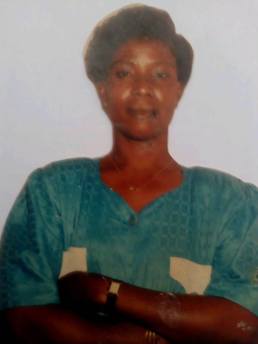









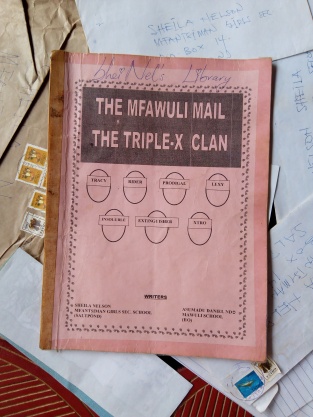
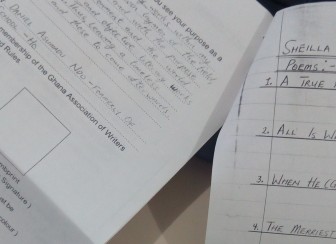


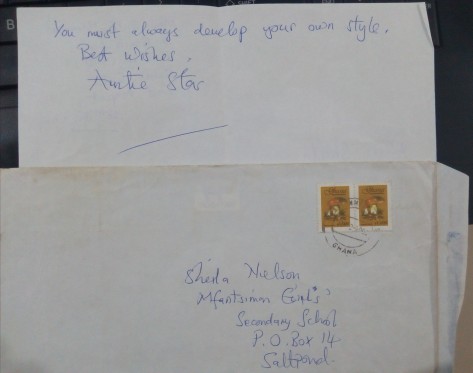




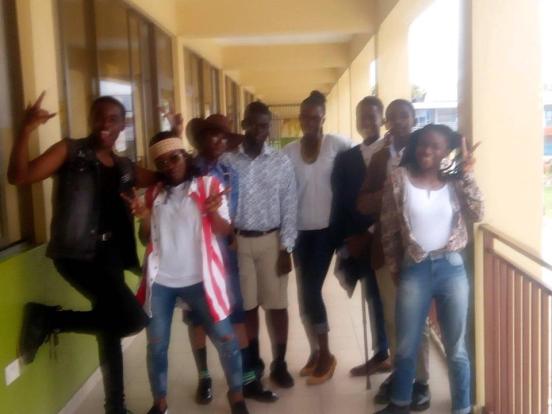






















![olivander-dice[1]](https://aishawrites.files.wordpress.com/2015/08/olivander-dice11.jpg?w=300&h=225)

![poetryy[1]](https://aishawrites.files.wordpress.com/2015/07/poetryy1.jpg?w=300&h=156)




